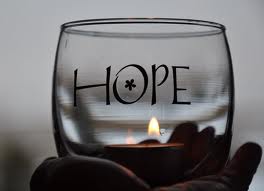Hope is not Optimism
This is Advent, the season of hope. Yet our hopes were dashed on Friday. Many people haven’t felt like this since 9/11. The tragedy that struck that elementary school in Newtown makes us wonder. Is there any hope? Any hope for the kingdom? For a world where the lion and the lamb lie down together?
Hope, the great theologian Jurgen Moltmann reminds us, is not the same as optimism.
Optimism is an extrapolation from this small fact to that bigger one. If we have some small piece of evidence portending good, we can see our way to something bigger and better on the way. We can be optimistic.
But hope, said, Moltmann, is not extrapolative. It isn’t based on any evidence in the circumstances. Hope is based solely on the faithfulness of God, the promise of God. This is why hope can thrive even in the darkest moments, when extrapolative thinking leads only to despair: there is no reason to be optimistic.
The hope we harbor in Advent, when in the darkness we light a purple candle, is not optimism. Thank God!
It is based on the faithfulness of God, coming into our darkness with light, coming into our weakness with a strength we did not know we had within us, coming into our death and leading us to life.
Elie Wiesel, the Holocaust survivor and Nobel laureate, once spoke of Adam and Eve, and what he said surprised me. I thought I knew their story—they were the “first parents.” But Wiesel spun out the human story. Adam and Eve had two sons, Cain and Abel. Cain murdered his brother, and for his crime was banished. His “curse” was to live as a man on the run. He ran away, Wiesel reminded his listeners, and never came back. So Adam and Eve lost their two sons to violence.
And what was their response? No one could have blamed Eve if, through her tears, she had said, “No more children. It’s just too painful, too awful.” No one could have blamed Adam if he had turned dark and angry, if he had given up on the idea of a family.
Yet, Wiesel says, their response is to conceive another child. “And Adam knew his wife again, and she bore a son and called his name Seth” (Gen. 4:25).
Adam and Eve are great, Wiesel says, not because they were the “first parents,” but because when everything was taken away from them, they had the courage to hope again, to conceive new life.
That is hope. To love again after losing everything. To trust again, enough to create new life in a dangerous world. That is the hope we find in Advent, and it is not based on any circumstances. It finds its life in the faithfulness of God who promises that the darkness shall not overcome the light, and that out of death, life arises


I love this post, David. The promises of God are indeed an anchor for the soul. I have been thinking a lot about that lately, so reading your post today was a real encouragement. Thanks!
Thank you David, and special thanks for sharing the Wiesel wisdom. Best, leslie
Beautiful!
A wonderful separation of sentiment and truth. With God’s help, I abide in His hope. Thank you David!
Ann